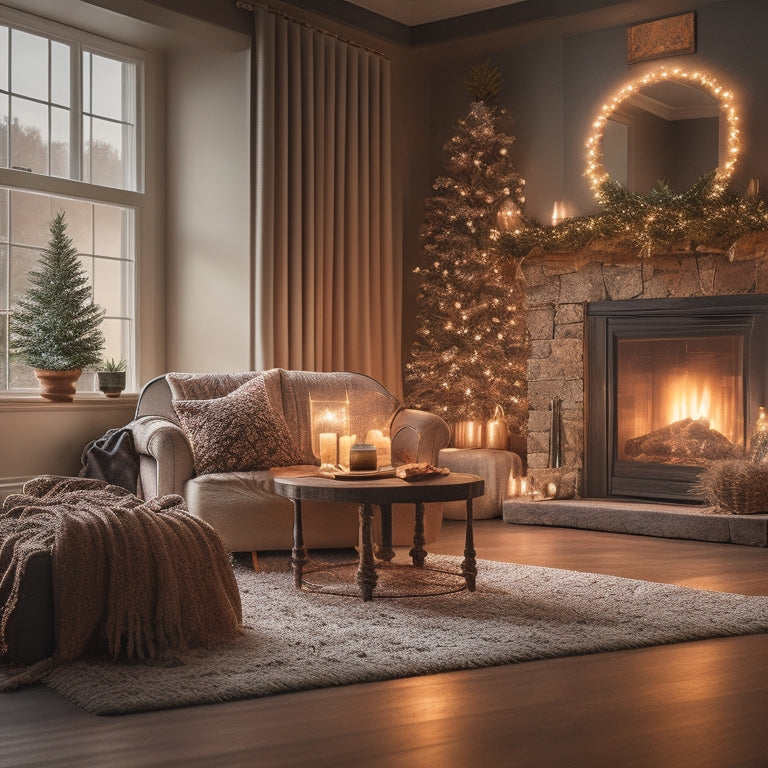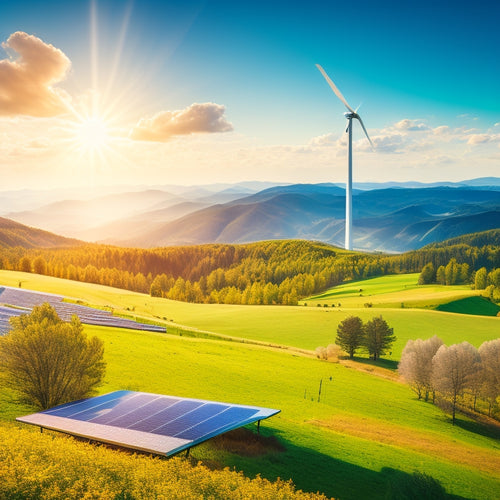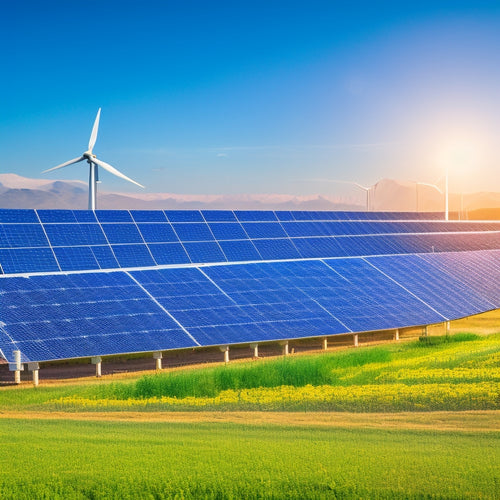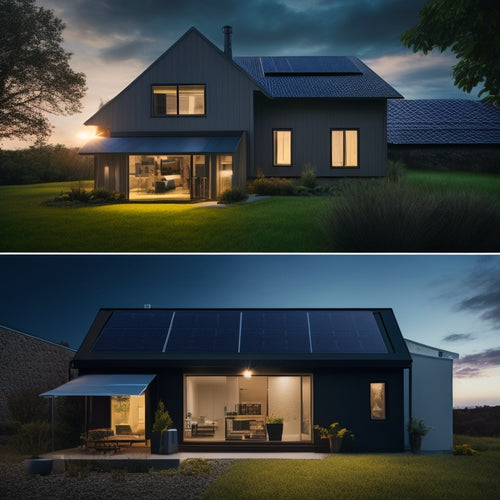
7 Winter Home Efficiency Hacks
Share
By implementing these 7 winter home efficiency hacks, you can greatly reduce your energy bills and carbon footprint. Start by sealing air leaks and gaps with drafting caulking, weather stripping, and spray foam insulation to minimize heat loss. Insulate pipes and water heaters to prevent freezing temperatures and heat loss. Upgrade to energy-efficient windows to reduce heat loss and gain. Maximize natural light and heat by optimizing window treatments and installing skylights. Improve your home's insulation with sustainable materials like recycled denim and natural wool. Optimize your heating system with routine maintenance and smart thermostat settings. Finally, conserve energy with smart plugs that provide real-time monitoring and automation. You'll be amazed at the impact these simple tweaks can have on your energy efficiency - and there's even more to investigate.
Key Takeaways
- Seal air leaks around doors, windows, and outlets to reduce heat loss and energy consumption.
- Insulate pipes and water heaters to prevent freezing temperatures and reduce heat loss.
- Upgrade to energy-efficient windows to minimize heat loss and gain, and reduce energy bills.
- Optimize natural light and heat by maximizing window treatments and using passive solar design.
- Use smart technology, such as smart plugs and thermostats, to monitor and reduce energy consumption remotely.
Seal Air Leaks and Gaps
Many air leaks and gaps around your home can add up to a significant loss of heat, resulting in higher energy bills and a colder living space. To combat this, you'll want to seal any openings around doors, windows, and electrical outlets.
In addition to reducing heat loss, sealing air leaks can also help reduce energy consumption, which is essential for Energy Efficient Homes.
Moreover, it's vital to reflect on sustainable insulation solutions, such as recycled denim or natural wool, to minimize heat loss and energy waste. Drafting caulking is a great solution for gaps around windows and doors, as it provides a flexible seal that can withstand temperature changes.
Weather stripping is another effective option for sealing gaps around doors and windows. You can also use spray foam insulation to fill larger gaps around electrical outlets and switches.
Insulate Pipes and Water Heaters
You'll want to protect your pipes from freezing temperatures by wrapping them with insulation, which can reduce heat loss and prevent costly damage.
Additionally, consider investing in a heater blanket to wrap around your water heater, as this can help reduce energy consumption and save you money on your utility bills.
By taking these steps, you'll be able to enjoy a more efficient and cost-effective winter season.
Moreover, optimizing energy usage is vital, especially in rural areas where energy autonomy is essential for uninterrupted farm operations.
Accurate system sizing and performance factors can also play a significant role in reducing energy waste and costs.
Pipe Wrap Insulation
Frequently, uninsulated pipes and water heaters are overlooked culprits of heat loss and energy waste in your home.
You can address this issue with pipe wrap insulation, a simple yet effective solution. By wrapping pipes with insulation, you'll enjoy several pipe insulation benefits.
For instance, it helps regulate temperature, ensuring that hot water remains hot and cold water stays cold. This reduces heat loss, saving you energy and money on your utility bills.
Additionally, pipe wrap insulation prevents pipes from freezing in extremely cold temperatures, reducing the risk of costly repairs.
Properly insulating your pipes is an essential step in maintaining a warm and efficient home during the winter months.
Heater Blanket Benefits
Beyond insulating individual pipes, consider wrapping your water heater with a heater blanket to maximize energy efficiency. This simple and cost-effective solution can help reduce heat loss and save you money on your energy bills. A heater blanket can also help prevent pipes from freezing, reducing the risk of costly repairs.
| Benefits | Description | Importance |
|---|---|---|
| Energy Savings | Reduces heat loss by up to 40% | High |
| Heater Blanket Safety | Prevents pipes from freezing and bursting | High |
| Extended Water Heater Life | Reduces wear and tear on the water heater | Medium |
Upgrade to Energy-Efficient Windows
Energy-efficient windows can be a game-changing factor for your winter home efficiency, and upgrading to them is a worthwhile investment.
You'll want to reflect on factors like window types, installation tips, and cost savings when making the switch. Additionally, off-grid solar systems provide energy independence, enabling homes to generate their own energy and reduce reliance on traditional power grids. This can lead to long-term savings achieved through reduced energy expenses and low maintenance costs.
Here are three key benefits to keep in mind:
- Energy ratings: Look for windows with high energy efficiency ratings, such as those with low U-factors and high R-values, to minimize heat loss and gain.
- UV protection: Energy-efficient windows often come with built-in UV protection, reducing fading and damage to furniture and carpets.
- Noise reduction: New windows can greatly reduce outside noise, making your home a quieter, more comfortable space.
Additionally, take into account aesthetic considerations, condensation issues, and long-term benefits when selecting your new windows.
Maximize Natural Light and Heat
As you work to minimize your reliance on artificial lighting and heating, maximizing natural light and heat becomes essential for winter home efficiency.
To do this, consider optimizing your window treatments for daylight harvesting, which involves using reflective surfaces and light-colored walls to reflect natural light deeper into your home.
Passive solar design also plays a key role, as it involves strategically orienting rooms to capture sunlight angles during the winter months.
Installing skylights can provide additional natural light, while indoor plants can help purify the air and reduce the need for artificial lighting.
Improve Your Home's Insulation
Frequently, homeowners overlook an essential aspect of winter home efficiency: proper insulation. You can greatly reduce heat loss by guaranteeing your home is well-insulated.
Insulation materials like fiberglass, cellulose, and spray foam can be used in various areas, including:
-
Attic insulation: Verify your attic has adequate insulation to prevent heat from escaping through the ceiling.
-
Wall insulation: Insulate your walls to keep warm air from seeping out and cold air from entering.
-
Basement insulation: Insulate your basement to prevent heat from escaping through the foundation.
Additionally, consider using draft stoppers, thermal curtains, and radiant barriers to further reduce heat loss.
Optimize Your Heating System
You can greatly enhance your heating system's performance by performing routine maintenance checks, which include inspecting and cleaning the system's components, ensuring proper ventilation, and identifying potential issues before they become major problems.
Regular filter replacement is also essential, as clogged filters can increase energy consumption and reduce airflow.
System Maintenance Checks
Several key components of your heating system require regular checks to confirm peak performance and efficiency.
To make sure your system runs smoothly, you should perform the following maintenance tasks:
-
Filter cleaning and blower maintenance: Clean or replace filters and inspect blower components to guarantee proper airflow.
-
Duct inspection and vent clearing: Inspect ducts for leaks and clear vents to prevent blockages that reduce system efficiency.
-
System calibration and safety inspection: Calibrate your system to confirm it's running at ideal levels, and perform a safety inspection to identify potential hazards.
Filter Replacement Importance
The efficiency of your heating system relies heavily on clean air filters, as dirty filters can lead to reduced airflow, increased energy consumption, and even premature system failure.
You can guarantee peak system performance by replacing filters regularly. The filter lifespan varies depending on the type and usage, but most filters should be replaced every 1-3 months.
Clean filters not only improve indoor air quality but also lead to energy savings and allergy reduction.
By replacing filters frequently, you can maintain your HVAC system's efficiency, reducing the risk of breakdowns and costly repairs.
Invest in high-quality filters and establish a replacement frequency to enjoy a cost-effective and comfortable winter season.
Thermostat Smart Settings
By virtue of its strategic placement, your thermostat plays a critical role in optimizing your heating system's performance, and smart settings can make all the difference in achieving peak efficiency.
You can access your thermostat's full potential by leveraging its smart features and programmable settings. This allows you to tailor your heating schedule to your unique needs and preferences.
To maximize energy savings, consider the following:
- Schedule temperature setbacks: Lower the temperature when you're away or sleeping to reduce energy consumption.
- Optimize your heating cycles: Adjust the frequency and duration of heating cycles to minimize energy waste.
- Utilize geofencing capabilities: Automatically adjust the temperature based on your location, ensuring you're not heating an empty home.
Conserve Energy With Smart Plugs
Power-hungry devices and appliances can secretly drain your wallet and the environment, even when turned off but still plugged in. Smart plugs can help you conserve energy by providing real-time energy monitoring and control over your devices. By plugging your devices into a smart plug, you can see exactly how much energy they're using, even when turned off.
| Smart Plug Benefits | Description |
|---|---|
| Energy Monitoring | Real-time monitoring of energy usage |
| Scheduling | Schedule on/off times for your devices |
| Remote Control | Control your devices from your smartphone |
| Automation | Automate your devices with custom routines |
With smart plugs, you can identify energy-hungry devices and make changes to reduce your energy consumption. By conserving energy, you'll not only save money on your utility bills, but you'll also reduce your carbon footprint.
Frequently Asked Questions
Can I Still Use My Ceiling Fan in the Winter?
You can still use your ceiling fan in winter, but adjust the direction to clockwise; this creates an upward airflow, redistributing warm air, and providing winter fan benefits like energy efficiency and cost savings.
How Often Should I Change My Furnace Air Filter?
You'd be shocked at how often you should swap out that furnace air filter - ideally every 1-3 months, depending on filter type and usage! Proper furnace maintenance tips dictate regular changes to maintain ideal airflow and efficiency.
Will Weatherstripping Damage My Door or Window Frames?
When applying weatherstripping, you'll want to choose materials compatible with your door frame's material to avoid damage; for instance, foam tape is suitable for wood or metal frames, while felt is better for vinyl or aluminum frames, ensuring a secure, damage-free seal.
Can I Install Smart Plugs With Old or Outdated Outlets?
You can install smart plugs with old or outdated outlets, but check the smart plug's compatibility first; if not compatible, consider outlet upgrade options, such as replacing old outlets with smart-enabled ones or using adapters for seamless integration.
Do Energy-Efficient Appliances Really Make a Big Difference?
You'll find energy-efficient appliances do make a significant impact, as they're designed to consume less power while maintaining performance, leading to extended appliance lifespan and substantial energy savings over time, resulting in a noticeable reduction in your utility bills.
Related Posts
-

Renewable Energy Solutions to Reduce Your Carbon Footprint
To reduce your carbon footprint, adopting renewable energy solutions is key. Using solar panels or wind turbines can ...
-

The Role of Battery Monitoring Systems in Renewable Energy
Battery monitoring systems play an essential role in renewable energy by enhancing system longevity and optimizing pe...
-

Cost of Home Solar Battery
You're looking to invest in a home solar battery to reduce your grid reliance, but you're curious about the cost. The...


